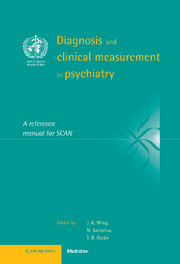Book contents
- Frontmatter
- Contents
- List of authors and SCAN Advisory Committee
- Preface
- Acknowledgements
- 1 Measurement and classification in psychiatry
- 2 The PSE tradition and its continuation in SCAN
- 3 Aims and structure of SCAN
- 4 The SCAN Glossary and principles of the interview
- 5 SCAN translation
- 6 Technical procedures
- 7 Training in the use of SCAN
- 8 International field trials: SCAN-0
- 9 SCAN-1: Algorithms and CAPSE-1
- 10 Development of SCAN-2.1
- 11 Computerisation of SCAN-2.1: CAPSE-2
- 12 Clinical, educational and scientific uses
- Subject index
9 - SCAN-1: Algorithms and CAPSE-1
Published online by Cambridge University Press: 05 August 2016
- Frontmatter
- Contents
- List of authors and SCAN Advisory Committee
- Preface
- Acknowledgements
- 1 Measurement and classification in psychiatry
- 2 The PSE tradition and its continuation in SCAN
- 3 Aims and structure of SCAN
- 4 The SCAN Glossary and principles of the interview
- 5 SCAN translation
- 6 Technical procedures
- 7 Training in the use of SCAN
- 8 International field trials: SCAN-0
- 9 SCAN-1: Algorithms and CAPSE-1
- 10 Development of SCAN-2.1
- 11 Computerisation of SCAN-2.1: CAPSE-2
- 12 Clinical, educational and scientific uses
- Subject index
Summary
Introduction
It has been accepted, in Chapter 1, that the ICD-10 term, ‘mental disorder’ is more appropriate than the term ‘disease’ in the present state of development of psychiatric nosology. Until biological markers are as well established as, for example, in diabetes, research of all kinds – biological, psychological and social – is likely to be fostered by the development of clinical assessment systems that allow clinical phenomena (experiential and behavioural) to be elicited, recognised and recorded reliably. This provides a basis of clinical fact broad enough, and defined and described in terms specific enough, to allow worldwide communicability, irrespective of classification.
The application of sets of classifying rules to this database is, relatively speaking, a simpler problem, although it tends to be the one that most workers think of first when trying to standardise methods of diagnosis. They start with the classifying criteria, and are well satisfied if these can be specified, in terms of rules linking clinical items delineated only by their names, clearly and simply enough to be easily used in practice by most clinicians. The strategy is least effective when there are many different sets of such rules, with rather little in the way of empirical validation for any one of them. A sensible solution is to adopt one or two of them (e.g. ICD-10 and DSM-IV) as standard, or reference, sets. If the database is broad enough, research workers can use, in addition, whatever other classifications suit their purpose.
The output of the SCAN system, therefore, can be as simple or as complex as any of its users require, if they are able and willing to analyse the material collected themselves. Most users, however, want a standard output that will serve many functions reasonably well. Experience in the field trials of SCAN-0 demonstrated that the following output functions were regarded as important:
– ICD-10, DSM-III-R, and eventually DSM-IV, category profiles with episode dates
– Index of Definition for ICD-10 (ID)
– Item Group (IG) probabilities, score profile and rating table
– Symptom Type (ST) score profile
– List of items rated present
– Standard statistical analysis of data from a series of cases
– PSE-10/PSE-9 conversion with output from CATEGO-4
Creating the diagnostic algorithms
At that time DSM-III-R (1987) and ICD-10 provided lists of operational rules for making diagnoses.
- Type
- Chapter
- Information
- Diagnosis and Clinical Measurement in PsychiatryA Reference Manual for SCAN, pp. 110 - 115Publisher: Cambridge University PressPrint publication year: 1998



